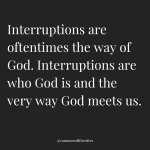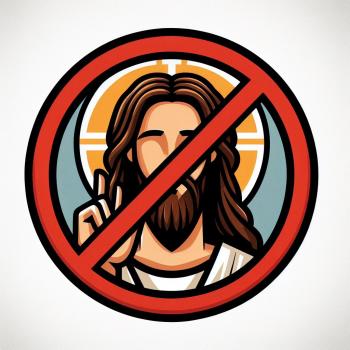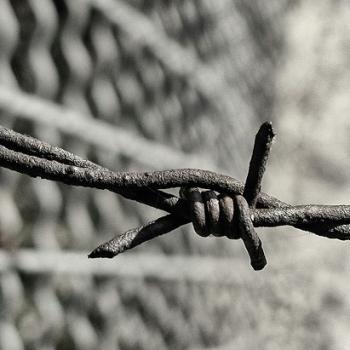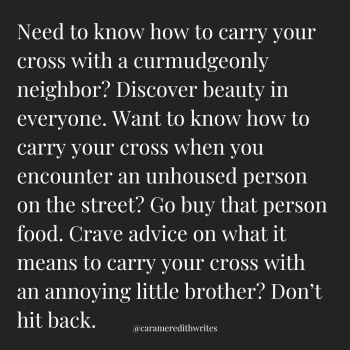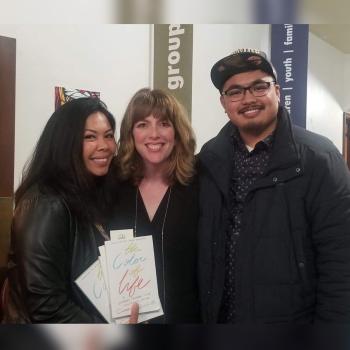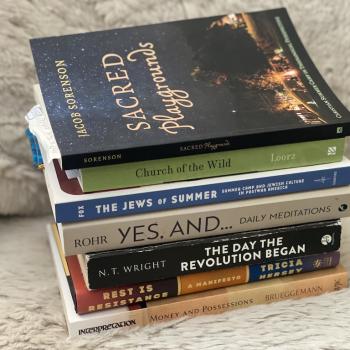Here’s a sermon for you from October 23, 2022, preached at St. Paul’s Episcopal in San Rafael. Eventually I’ll pen some regular articles again, but short sermons always feel appropriate for squeaky topics like humility, wouldn’t you say? Enjoy!
—

Ah, humility.
In our house, the tendency to prove yourself better than your brother often happens, so much so that the words “one-upping” have become a regular part of my vocabulary.
“Today, during lunch recess kickball, I kicked the ball all the way to the other side of the field!”
“Well today, during morning recess, we played kickball and I kicked the ball all the way to the top of the stairs, to the top of the slide at the playground.”
“Yo, dudes: stop one-upping each other,” I’ll say.
“But I kicked the ball at least 100 feet!”
“And I kicked the ball at least a hundred feet more!”
“You’re one-upping each other. I said stop.”
“But I-“ “Stop.” “Well I.” “Nope.” “BUT….” “Kindness, please. No more one-upping!”
I know their conversation is normal: at eight and ten years old, it’s normal to be proud of your kickball-kicking skills. It’s normal to experience a little bit of rivalry with your sibling. It’s normal to think of yourself more highly than you ought.
And it’s normal, whether you’re eight or ten or eighty and ten to be reminded of humility and even experience “the state of being humble.”
At first glance, this week’s gospel reading is rather clear-cut: Jesus decides to tell a story to some folks who believed they were rather “righteous and regarded others with contempt.” As Eugene Peterson put it, Jesus “told his next story to some who were complacently pleased with themselves over their moral performance and looked down their noses at the common people.”
Two individuals, a Pharisee, who does everything right, and a tax collector, who does everything wrong, are placed next to each other. You can imagine the Pharisee: he goes up to the front altar and raises his hands in the air. He closes his eyes and loudly prays heavenward: “Oh, God, I thank you that I am not like other people – robbers, crooks, adulterers, or, heaven forbid, like this tax man. I fast twice a week and tithe on all my income.”
The tax collector, meanwhile, doesn’t dare come up the front steps. He kneels over there in the corner, “slumped in the shadows, his face in his hands. Not daring to look up, says, ‘God, give mercy. Forgive me, a sinner.’”
It’s easy to look at this passage (and even at Jesus’ comments that follow) and come to a clear solution: we know who we’re supposed to be like and not be like. We know whose side we’re supposed to choose, whose part we’re supposed to play.
This is also where the problem lies, though, because the parable quickly becomes an either/or type of situation: either be like the Pharisee (not humble) or be like the tax collector (totes humble).
But side with the tax collector, and you side with the one that must have been doing something wrong, something that prompted him to a most “powerful demonstration of humility” because he was outright stealing money from the people around him. Side with the Pharisee, and we negate the fact that he was a righteous man – he really was doing what he was supposed to be doing before God and his community. As one theologian asks, “What if the Pharisee’s good works helped in the justification of the tax collector?”
No matter what side you choose, all of this becomes rather complicated, kind of like us humanity, in general. And as another theologian states, “anytime you draw a line between who’s in and who’s out … you will find God on the other side. Read this way, the parable ultimately escapes even its narrative setting and reveals that it is not about self-righteousness and humility any more than it is about a pious Pharisee and a desperate tax collector. Rather, this parable is about God: God who alone can judge the human heart; God who determines to justify the ungodly.”
Oh yeah, the gospel passage is about God.
This is where Psalm 65 then comes into play, for in this Psalm, the “yous” abound:
Praise is due to you, O God, in Zion
to you shall vows be performed,
you who answer prayer!
To you all flesh shall come.
When deeds of iniquity overwhelm us, you forgive our transgressions.
Five “yous” already, and then some more:
You choose. You are the hope. You established. You are girded with might. You silence. You make the gateways the morning. You visit the earth. You greatly enrich it. You feed us, for you’ve prepared it. You water it. You crown the year.
You, you, you, you, you, God.
Because maybe, when it comes to conversations of humility, the invitation is simply to remember that it’s not about us. The invitation is to matter who it’s really about.
A couple of nights ago, a crew from our neighborhood gathered around the backyard table. We call ourselves Garden Club, because all of us share a love of gardening. It was the second time we’ve been together, and for us, the rules are simple: come, as you are. Bring something to share: food, drinks, seeds, seedlings, whatever! One woman brought a bottle of homemade kombucha; another, sourdough focaccia topped with cherry tomatoes she grew from seed. There was a bottle of homemade plum wine, a plate of muffins, a pot of curry soup, as well as Japanese spinach seedlings and succulents for everyone to take home.
Generosity abounded. Authenticity poured forth. Humility reigned.
At one point, which was probably halfway in between my third piece of focaccia and my first sip of plum wine, we answered the questions that have become standard to our gatherings: What are you growing right now? When it comes to the garden, what problems do you bring with you?
We talked about crab grass and best garlic varietals, changing climates and drip irrigation systems. God, it was glorious.
Here we were, a group of near-strangers – Black and white and Asian and Latino, gay and straight, young and old – all brought together because we live in the same neighborhood and like to grow things. Most of us don’t know each other’s last names, nor do we know each other’s day jobs.
We simply know that gathering together matters. It matters that we be good neighbors, that we live out this generosity, that we come to the table and share a slightly awkward meal.
I don’t think this is too different from our passage at hand, when we’re reminded of the who that matters, and that in this place, with these people (which is you and us and me) that we not pick sides in individual quests toward humility but that we come together and keep pointing to the One who brought us together in the first place.
Look God, it’s you, we say. You, you, you, you, you.
So we show up in this place so we can be reminded of God – and we show up in this place so God can remind us that we beloved children of God.
You are loved by the one who can’t get enough of you, God says. You are loved by the one who formed you in your mother’s womb, God reminds. You are a beloved child of God who matters just because you’re you, God shouts.
And I don’t know about you, but that’s some one-upping I can get behind.
Amen? Amen.
—
Humility isn’t something we always want to talk about, because isn’t talking about humility kind of the opposite of humility? But hey, let’s give it a try: leave a comment and start the conversation!


